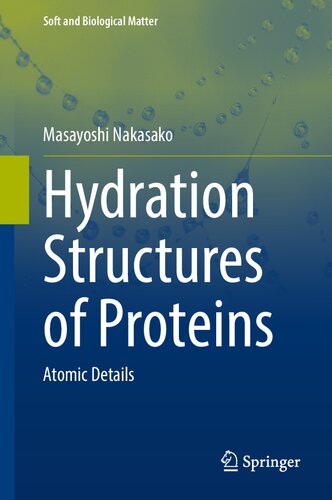

Most ebook files are in PDF format, so you can easily read them using various software such as Foxit Reader or directly on the Google Chrome browser.
Some ebook files are released by publishers in other formats such as .awz, .mobi, .epub, .fb2, etc. You may need to install specific software to read these formats on mobile/PC, such as Calibre.
Please read the tutorial at this link: https://ebookbell.com/faq
We offer FREE conversion to the popular formats you request; however, this may take some time. Therefore, right after payment, please email us, and we will try to provide the service as quickly as possible.
For some exceptional file formats or broken links (if any), please refrain from opening any disputes. Instead, email us first, and we will try to assist within a maximum of 6 hours.
EbookBell Team

4.8
54 reviewsThis book describes hydration structures of proteins by combining experimental results with theoretical considerations. It is designed to introduce graduate students and researchers to microscopic views of the interactions between water and biological macromolecules and to provide them with an overview of the field. Topics on protein hydration from the past 25 years are examined, most of which involve crystallography, fluorescence measurements, and molecular dynamics simulations.
In X-ray crystallography and molecular dynamics simulations, recent advances have accelerated the study of hydration structures over the entire surface of proteins. Experimentally, crystal structure analysis at cryogenic temperatures is advantageous in terms of visualizing the positions of hydration water molecules on the surfaces of proteins in their frozen-hydrated crystals. A set of massive data regarding hydration sites on protein surfaces provides an appropriate basis, enabling us to identify statistically significant trends in geometrical characteristics. Trajectories obtained from molecular dynamics simulations illustrate the motion of water molecules in the vicinity of protein surfaces at sufficiently high spatial and temporal resolution to study the influences of hydration on protein motion. Together with the results and implications of these studies, the physical principles of the measurement and simulation of protein hydration are briefly summarized at an undergraduate level.
Further, the author presents recent results from statistical approaches to characterizing hydrogen-bond geometry in local hydration structures of proteins. The book equips readers to better understand the structures and modes of interaction at the interface between water and proteins. Referred to as “hydration structures”, they are the subject of much discussion, as they may help to answer the question of why water is indispensable for life at the molecular and atomic level.